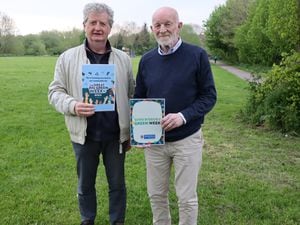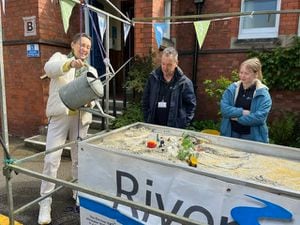£1.2m Biolinks project run by Shropshire group hailed as environmental success
A £1.2million project to boost the number of biological recorders in Shropshire and beyond has been hailed a success.

And the hope is it will form the national ‘blueprint’ for future initiatives to support conservation, thanks to The National Lottery Heritage Fund.
The BioLinks project is run by environmental education charity, the Field Studies Council, which has its headquarters based near Telford, in the Shropshire countryside and is a national leader in environmental education.
The project has helped to train more than 5,500 learners with the necessary skills and knowledge to identify a range of invertebrates including some of the UK’s most vulnerable groups such as bees and beetles.
The training has resulted in more than 35,000 additional invertebrate records being submitted to the national record database – a central system which stores information about wildlife sightings from across the UK.

Keiron Derek Brown, BioLinks project manager, said: “The success of this project is hugely significant particularly at a time when there is so much concern for our declining UK species.
“Information on sightings submitted to the national database is used by researchers and wider organisations to influence conservation policy and land management schemes so there is a pressing need to ensure people have the right skills to accurately record species as well as the knowledge to submit records.
“This project directly addressed that need by training thousands of individuals – those with little or no previous knowledge right through to professionals in the sector who were looking to upskill and apply their understanding of invertebrate ecology directly to the management of existing wildlife sites and nature reserves.
“Understanding what species live where can tell us so much about a particular habitat and environment and can help guide us on what we do next in terms of site management and protection of species. The more data we have, the more accurately we can determine whether a particular species is in decline.
“We really hope this project has ignited a life-long interest in invertebrate recording amongst individuals and those involved in the project will continue to use their skills to submit recordings to the national database.
“The project was only made possible with funding from The National Lottery Heritage Fund so we are incredibly thankful that they chose to support this worthwhile initiative.”
The primary aims of the five-year BioLinks project were to strengthen the UK’s biological recording network and develop a community of guardians to protect the nation’s biodiversity especially invertebrates.
Robyn Llewellyn, Director, England, Midlands & East at The National Lottery Heritage Fund said: “We are proud to have supported this valuable project in strengthening the biological recording community, widening networks, and creating opportunities for individuals.
“Thanks to National Lottery players we will continue to fund projects that support nature conservation and boost the quality and quantity of wildlife-rich habitats across the country.”

The project came to an end earlier this year but throughout its duration expert tutors at the Field Studies Council delivered training at more than 490 different events.
It also delivered 36 online training courses attended by more than 4,500 learners; hosted 85 webinars attended by more than 12,000 participants; and generated online-related resources which were viewed more than 70,000 times.
An independent evaluation of the project highlighted its success with those involved in the biological recording sector suggesting the scheme should now become the ‘blueprint’ for future initiatives.
Olivia Watts, wildlife biologist with the charity, added: “It’s really important that we find ways to continue educating people with the right skills for identifying, recording and submitting accessible and accurate data on UK species so that researchers and institutions can inform and influence future policy makers.
“One of the things we’ve done to ensure the legacy of the BioLinks project is to make many of the training plans and teaching resources openly accessible to other organisations looking to run similar initiatives, so they don’t need to start from scratch. This kind of knowledge and information sharing is crucial."
The Field Studies Council celebrates its 80th year. It runs residential trips and specialist courses for all ages from primary school upwards and was instrumental in the long-running campaign to bring about the new Natural History GCSE qualification, which could be taught in schools by 2025.
“It’s our mission at the Field Studies Council to engage as many people, young and old, in the natural world,” said Olivia. “We have biodiversity events which introduce children as young as five to nature and wildlife in the hope it will spark a curiosity in them to care for and protect our natural world.
“By capturing their imaginations at a young age, it’s these children who will grow up to be our future invertebrate recorders. It’s why teaching field skills such as species identification is important from a young age and why fieldwork in subjects such as biology, geography and environmental science should all continue to feature in the national curriculum.”





